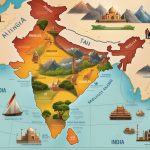Did you know that India is home to the largest education system in the world? With over 260 million students enrolled in schools and universities, the scale and impact of education in India are truly remarkable. Whether you’re a student looking to broaden your horizons or an academic seeking new opportunities, the Indian education system has plenty to offer.
Key Takeaways:
- The education system in India is the largest in the world, with over 260 million students.
- India offers diverse academic programs, cultural immersion, and affordability for international students.
- Indian universities are known for their academic excellence and research contributions.
- Challenges like language barriers and cultural differences may be faced by international students studying in India.
- Career opportunities and collaboration programs with global institutions are available in the Indian education system.
Overview of the Indian Education System
The Indian education system is a diverse and vast framework that caters to the educational needs of millions of students. It encompasses various levels of education, from primary schools to higher education institutes, offering a wide range of academic disciplines and career pathways.
At the primary level, children between the ages of 6 and 14 receive compulsory education, which is provided by both government and private schools. The curriculum at this stage focuses on building foundational knowledge and skills across subjects such as mathematics, languages, science, social studies, and arts.
Secondary education follows primary education and usually spans from ages 14 to 18. Students undergo examinations such as the Secondary School Certificate (SSC) or the Indian Certificate of Secondary Education (ICSE) at the end of this phase to progress further in their academic journey.
After completing secondary education, students can choose between three major academic streams: science, commerce, and humanities. Science students typically pursue careers in engineering, medicine, or other scientific fields. Commerce students focus on subjects like economics, business, and finance, preparing them for careers in commerce and management. Humanities students delve into subjects like literature, history, philosophy, and social sciences, opening doors to careers in arts, humanities, and social sciences.
Following the completion of secondary education, students have the option to pursue undergraduate degrees in various fields, such as engineering, medicine, business, arts, and sciences. Indian universities offer a wide range of academic programs to cater to the diverse interests and career aspirations of students.
Indian higher education institutes are renowned for their rigorous academic standards and focus on research and innovation. Postgraduate degrees are also available in various fields, providing opportunities for specialization and advanced learning.
The Indian education system places a strong emphasis on academic performance and examinations are integral to the evaluation process. National-level entrance examinations like the Joint Entrance Examination (JEE) and the National Eligibility cum Entrance Test (NEET) play a crucial role in determining admission to prestigious institutes for engineering, medical, and other professional programs.
Overall, the Indian education system is a robust ecosystem that aims to equip students with the knowledge, skills, and qualifications necessary for their future endeavors.
Key Features of the Indian Education System
The Indian education system is marked by several unique features that distinguish it from other systems worldwide. These key features play a significant role in shaping the educational experience for students in India.
Rote Learning
One prominent characteristic of the Indian education system is the emphasis on rote learning. Students are often required to memorize vast amounts of information, including formulas, historical dates, and grammatical rules. This approach aims to develop strong memory retention skills but has been subject to debate regarding its effectiveness in fostering critical thinking and creativity.
Examinations as Assessment
Examinations hold a vital position within the Indian education system. They serve as a primary method for assessing students’ knowledge and understanding. From periodic class tests to board exams, the evaluation process heavily relies on the performance in written assessments. While exams can promote a sense of competitiveness and accountability, some argue that they may lead to an excessive focus on grades rather than holistic development.
Academic Performance
In the Indian education system, academic performance holds immense importance. Students’ achievements, particularly in board exams, are often considered critical for future opportunities, including college admissions and employment prospects. This focus on academic excellence reflects the belief that success in academics leads to success in life.
“The Indian education system places a high value on academic performance as a measure of success.” – Education Expert
While the Indian education system has traditionally prioritized academic excellence, there is a growing recognition of the importance of holistic development. Schools and universities are increasingly incorporating extracurricular activities, sports, and personality development programs to foster well-rounded individuals.
Competitive Entrance Examinations
Another distinctive feature of the Indian education system is the prevalence of competitive entrance examinations for admission to prestigious institutions. These exams, such as the Joint Entrance Examination (JEE) and the National Eligibility cum Entrance Test (NEET), are highly competitive and often determine students’ access to top-tier colleges and professional courses.
The Indian education system follows a tiered structure, with different levels of institutions offering varying degrees of educational quality. The premier institutions, such as the Indian Institutes of Technology (IITs) and Indian Institutes of Management (IIMs), are widely recognized for their academic rigor and research contributions.
Diversity in Languages and Cultures
India’s diverse linguistic and cultural landscape is reflected in its education system. With numerous regional languages and cultural traditions, students in different states may follow different curricula and textbooks. This diversity enhances cultural inclusivity but also poses challenges in creating a standardized national curriculum.
| Key Features | Description |
|---|---|
| Rote Learning | Emphasis on memorization of information. |
| Examinations as Assessment | Assessment primarily through written exams. |
| Academic Performance | Significance of grades as a measure of success. |
| Holistic Development | Focused on all-round personality development. |
| Competitive Entrance Examinations | Highly competitive exams for college admissions. |
| Tiered System | Varying levels of institutions based on quality. |
| Diversity in Languages and Cultures | Regional variations in curricula and textbooks. |
University Rankings in India
When it comes to higher education, it is essential for students to choose a university that not only offers quality education but also has a strong reputation. University rankings play a crucial role in determining the academic excellence of an institution. In this section, we will explore the university rankings in India, showcasing some of the top institutions known for their academic prowess and research contributions.
Top Ranked Universities in India
The university rankings in India provide valuable insights into the performance and reputation of various institutions. Let’s take a look at some of the top-ranked universities in India:
| University | Ranking |
|---|---|
| Indian Institute of Technology Bombay (IIT Bombay) | 1 |
| Indian Institute of Science (IISc) Bangalore | 2 |
| Indian Institute of Technology Delhi (IIT Delhi) | 3 |
| Indian Institute of Technology Madras (IIT Madras) | 4 |
| University of Delhi | 5 |
These universities consistently top the rankings due to their commitment to academic excellence, research output, and global reputation. They offer a wide range of programs across various disciplines and attract a diverse international student community.
The Significance of University Rankings
University rankings serve as a valuable resource for students who are planning to pursue higher education in India. They provide an objective assessment of universities based on various factors, including academic reputation, faculty expertise, research output, and student satisfaction. Students can use this information to make informed decisions about their educational journey.
“University rankings offer students an insight into the academic excellence of various institutions, helping them choose the right university for their educational goals.”
Furthermore, university rankings also contribute to the overall development of higher education institutions. They serve as a benchmark for universities to strive for excellence, encouraging them to improve their teaching methodologies, research facilities, and industry collaborations.
Benefits of Studying in India
Studying in India offers numerous benefits for international students, making it an attractive destination for education. From affordability to diverse academic programs, cultural immersion, and the opportunity to build a global network, there are compelling reasons why students choose India as their study destination.
Affordability
One of the key advantages of studying in India is its affordability. Compared to many other study destinations, the cost of education in India is relatively low. Tuition fees for courses are affordable, and living expenses are reasonable, making it easier for students to manage their finances. This affordability allows students to pursue quality education without incurring excessive financial burden.
Diverse Academic Programs
India is renowned for its diverse range of academic programs across various disciplines. From engineering and technology to arts, humanities, medicine, and business, Indian universities offer a wide array of courses to cater to different interests and career aspirations. Students have the opportunity to choose from a rich selection of programs and specialize in their chosen field.
Cultural Immersion
Studying in India provides an immersive cultural experience for international students. With its rich history, vibrant traditions, and diverse population, India offers a unique blend of cultures and traditions that students can explore and embrace. By living and studying in India, students gain a deep understanding of its customs, traditions, and way of life, enhancing their global perspective and cultural sensitivity.
Opportunity to Build a Global Network
Studying in India offers the opportunity to build a global network of contacts, connecting with fellow students, faculty members, and professionals from around the world. Indian universities attract a diverse community of students, fostering an environment that encourages cross-cultural interactions and collaboration. This global network can open doors to future career opportunities and create lifelong friendships.
Studying in India offers a unique blend of affordability, diverse academic programs, cultural immersion, and the opportunity to build a global network.
Overall, the benefits of studying in India make it an excellent choice for international students seeking a quality education, cultural enrichment, and global exposure. Whether it’s the affordable education, diverse academic programs, immersive cultural experiences, or the chance to expand their network, studying in India offers a host of advantages that can shape a student’s future success.
| Benefits | Description |
|---|---|
| Affordability | Low tuition fees and reasonable living expenses make education in India affordable for international students. |
| Diverse Academic Programs | Indian universities offer a wide range of programs in various fields, providing students with ample choices. |
| Cultural Immersion | Living and studying in India allows students to immerse themselves in the country’s rich culture and traditions. |
| Opportunity to Build a Global Network | Studying in India facilitates the creation of a global network, connecting students with peers from around the world. |
Academic Pathways in the Indian Education System
When it comes to academic pathways, the Indian education system offers a wide range of choices for students to explore and pursue their interests. From high school to higher education, students have the opportunity to specialize in various disciplines and shape their academic journey according to their aspirations and strengths.
One of the first decisions students in India make is choosing their academic pathway in high school. Traditionally, students are presented with three main streams to choose from: science, commerce, and humanities. This choice lays the foundation for their future academic and career trajectory.
Science Stream: Students who opt for the science stream in high school have a keen interest in subjects like physics, chemistry, biology, and mathematics. This pathway prepares them for a range of careers in fields such as medicine, engineering, research, and technology. Pursuing a science stream also opens doors to undergraduate degrees in disciplines like engineering, medical sciences, and pure sciences.
Commerce Stream: Students who have an affinity for economics, business, and finance often choose the commerce stream. This pathway equips them with knowledge in subjects like economics, accountancy, business studies, and mathematics. With a commerce background, students can explore undergraduate degrees in fields such as commerce, finance, accounting, business administration, and marketing.
Humanities Stream: For students interested in subjects like literature, history, sociology, and political science, the humanities stream offers a comprehensive understanding of the human experience. This pathway opens doors to undergraduate degrees in disciplines such as arts, social sciences, media studies, law, journalism, and more.
After completing high school, students can pursue undergraduate degrees in their chosen field. Indian universities are known for offering a wide range of undergraduate programs in various disciplines, providing students with the opportunity to further specialize and deepen their knowledge.
At the postgraduate level, students can choose to pursue master’s degrees and doctoral programs to further enhance their expertise and qualifications. Indian universities offer a plethora of postgraduate programs across disciplines like science, technology, business, humanities, social sciences, and more, allowing students to embark on advanced academic journeys.
Whether students choose to follow the scientific, commercial, or humanities path, the Indian education system provides a solid foundation for academic and career success. By offering diverse academic pathways, students have the freedom to explore their interests, hone their skills, and embark on rewarding professional journeys in their chosen fields.
Admission Process in Indian Universities
Applying to Indian universities can be an exciting and rewarding journey for international students. In this section, we will guide you through the admission process, including the entrance exams, required documents, and eligibility criteria.
Entrance Exams
Many Indian universities require students to take entrance exams as part of the admission process. These exams assess a student’s knowledge, aptitude, and potential in their chosen field of study. The exams can vary depending on the course and university, with some of the popular entrance exams including:
- Joint Entrance Examination (JEE) for engineering and architecture courses
- Common Law Admission Test (CLAT) for law courses
- National Eligibility cum Entrance Test (NEET) for medical courses
- Graduate Aptitude Test in Engineering (GATE) for postgraduate engineering courses
It is important to check the specific entrance exams required for your desired course and university and prepare accordingly.
Required Documents
When applying to Indian universities, international students are typically required to submit the following documents:
- Completed application form
- Passport-sized photographs
- Photocopies of academic transcripts and certificates
- Proof of English language proficiency (such as IELTS or TOEFL scores)
- Statement of Purpose (SOP)
- Letters of recommendation
- Proof of financial ability to cover tuition and living expenses
- Medical certificate and health insurance
- Visa documents (if applicable)
Make sure to carefully review the requirements for each university and provide the necessary documents to complete your application.
Eligibility Criteria
Indian universities have specific eligibility criteria for international students. It is important to fulfill these requirements to be considered for admission. Common eligibility criteria include:
- Meeting the minimum academic qualifications for the course
- Obtaining a satisfactory score in the entrance exam (if required)
- Meeting the minimum English language proficiency requirements
- Fulfilling any age restrictions set by the university
Each university may have its own set of additional criteria, so it is advisable to check the official website or contact the admissions office for specific information.
| Entrance Exams | Required Documents | Eligibility Criteria |
|---|---|---|
| JEE | Completed application form | Meeting the minimum academic qualifications |
| CLAT | Passport-sized photographs | Obtaining a satisfactory score in the entrance exam |
| NEET | Photocopies of academic transcripts and certificates | Meeting the minimum English language proficiency requirements |
| GATE | Proof of English language proficiency | Fulfilling any age restrictions set by the university |
Scholarships and Financial Aid for International Students in India
International students who aspire to pursue their education in India can explore various scholarships and financial aid options to support their academic journey. These opportunities aim to make education more accessible and affordable for students from around the world.
Scholarship Programs
Indian universities and organizations offer scholarships specifically designed for international students. These scholarships recognize academic merit, talent, and potential. They can cover tuition fees, accommodation expenses, and sometimes even provide a stipend to cover living costs.
“Receiving a scholarship can be a game-changer for international students. It not only eases their financial burden but also acts as a recognition of their academic achievements.”
To be eligible for scholarships, international students may need to meet certain criteria, such as maintaining a certain grade point average (GPA) or participating in specific extracurricular activities. It is essential to thoroughly research and apply for relevant scholarship programs well in advance to maximize the chances of receiving financial support.
Financial Aid and Grants
In addition to scholarships, international students can explore other forms of financial aid and grants. These options are offered by universities, government bodies, and non-profit organizations to ensure that deserving students can pursue their education without financial constraints.
Financial aid may include partial tuition fee waivers, grants for research projects, or funding for specific fields of study. Some organizations also provide need-based scholarships, offering financial assistance to students who demonstrate financial hardship.
Education Loans
For international students who may not qualify for scholarships or financial aid, education loans can be a viable option. Banks and financial institutions in India offer student loans at competitive interest rates. These loans help cover tuition fees, living expenses, and other related costs.
Before taking out an education loan, students should carefully consider the terms and conditions, interest rates, repayment options, and any applicable collateral requirements. Seeking guidance from a financial advisor can help students make informed decisions.
Scholarships and Financial Aid Options
| Scholarship/Financial Aid Program | Description | Eligibility Criteria | Benefits |
|---|---|---|---|
| MHRD Scholarship for Indian Diaspora | Government scholarship for students of Indian origin residing outside India. | Indian origin student pursuing undergraduate/postgraduate courses | Tuition fee waiver, monthly stipend, accommodation allowance |
| Fulbright-Nehru Research Fellowships | Research fellowships for outstanding Indian students to pursue doctoral studies in the United States. | Indian citizens with a master’s degree | Tuition fee, living expenses, health insurance coverage |
| Commonwealth Scholarship and Fellowship Plan | Scholarships for students from commonwealth countries to pursue higher education in India. | Citizens of commonwealth countries | Tuition fee waiver, living allowance, airfare |
These are just a few examples of scholarships and financial aid options available for international students in India. It is advisable to consult university websites, government portals, and relevant organizations to explore more opportunities and stay updated with application deadlines.
Quality of Education in Indian Universities
When it comes to pursuing higher education, the quality of education is a primary concern for students and parents alike. Indian universities have gained recognition globally for their commitment to providing a high standard of education. From faculty expertise to research opportunities, infrastructure to industry collaborations, Indian universities offer a holistic learning experience.
One of the key factors contributing to the quality of education in Indian universities is the expertise of the faculty. Renowned professors and scholars bring their vast knowledge and experience to the classrooms, providing students with valuable insights and guidance. This expertise extends beyond theoretical knowledge, as many faculty members are actively engaged in cutting-edge research, contributing to advancements in their respective fields.
Research opportunities are abundant in Indian universities, allowing students to delve deeper into their areas of interest. These institutions emphasize the importance of research and provide resources, funding, and guidance to facilitate meaningful contributions to the academic community. Engaging in research projects equips students with critical thinking skills, fosters innovation, and nurtures a passion for knowledge.
Furthermore, Indian universities boast state-of-the-art infrastructure that supports a conducive learning environment. Well-equipped libraries, laboratories, and research centers enable students to explore and experiment, pushing the boundaries of their understanding. The integration of technology in classrooms enhances the learning experience, making education accessible and interactive.
Indian universities also prioritize industry collaborations, forging partnerships with leading companies and organizations. These collaborations facilitate internships, industry visits, and guest lectures, bridging the gap between academia and the professional world. Such exposure equips students with practical skills and real-world insights, enhancing their employability and preparing them for successful careers.
The commitment to quality education in Indian universities is evident in their consistent efforts to adapt and innovate. These institutions strive to create an intellectually stimulating environment that nurtures holistic development and prepares students for the challenges of the modern world.
Challenges Faced by Global Learners in the Indian Education System
Studying in a foreign country brings its fair share of challenges, and international students in the Indian education system are no exception. Let’s explore some of the common hurdles faced by global learners in their pursuit of knowledge in India:
1. Language Barriers
One of the most significant challenges for international students in India is navigating the language barrier. Though English is widely spoken and used for instruction in many educational institutions, there may still be instances where students encounter regional languages or dialects that they are unfamiliar with. This can make it difficult to fully grasp lectures, interact with peers, and engage in academic discussions.
2. Cultural Differences
The cultural diversity of India is both fascinating and challenging for global learners. Adjusting to new cultural norms, social customs, and traditions can sometimes be overwhelming. However, embracing this diversity can contribute to a more enriching educational experience by fostering a deeper understanding and appreciation of different cultures.
3. Adapting to a New Academic Environment
The Indian education system may have a different structure, teaching styles, and evaluation methods compared to other countries. International students may find it challenging to adapt to these differences and excel academically. However, with time and support from peers and faculty, they can gradually acclimate to the new academic environment and develop effective study strategies.
4. Homesickness
Being away from home and familiar surroundings can trigger feelings of homesickness among global learners. Adjusting to a new country, climate, and lifestyle can be emotionally challenging, especially during the initial phase. Building a support network, staying connected with family and friends, and engaging in extracurricular activities can help alleviate homesickness.
Studying abroad presents a unique set of challenges, and international students in the Indian education system must navigate language barriers, cultural differences, and the adjustment to a new academic environment. However, with resilience, openness, and support, these challenges can be overcome, leading to a truly transformative learning experience.
Cultural Experiences and Diversity in Indian Universities
Indian universities offer a unique blend of cultural experiences and a diverse student community, making them an ideal destination for global learners seeking an enriching educational journey. Studying in India allows students to immerse themselves in a vibrant tapestry of traditions, languages, and customs, fostering cross-cultural interactions and providing exposure to different perspectives.
One of the standout features of Indian universities is the diverse student body comprising individuals from various states, regions, and even international backgrounds. This diverse mix of students creates a dynamic learning environment where individuals can learn from one another’s experiences, broaden their horizons, and develop a global mindset.
When studying in Indian universities, students have the opportunity to participate in cultural festivals and events that showcase the rich heritage and traditions of the country. These events offer a glimpse into Indian culture and provide a platform for students to celebrate diversity, fostering mutual understanding and appreciation.
Moreover, Indian universities often organize exchange programs and collaborations with international institutions, allowing students to interact with peers from different countries. This promotes cultural exchange, facilitates the exploration of different perspectives, and enhances global awareness.
The value of cultural experiences and diversity in Indian universities extends beyond the academic realm. It prepares students for the increasingly interconnected and multicultural world, equipping them with essential skills such as adaptability, empathy, and intercultural communication.
Cultural Diversity in Indian Universities
| State | Number of Languages Spoken | Notable Cultural Festivals |
|---|---|---|
| Uttar Pradesh | 16 | Kumbh Mela, Diwali |
| Tamil Nadu | 26 | Pongal, Navaratri |
| Kerala | 14 | Onam, Thrissur Pooram |
This table exemplifies the cultural diversity that students can experience in different states of India. Each state offers a unique cultural tapestry, allowing students to explore and appreciate the rich traditions and heritage of the country.
In conclusion, Indian universities provide an immersive cultural experience and a diverse student community, offering global learners the opportunity to develop a global mindset and broaden their perspectives. The value of cross-cultural interactions and exposure to diverse traditions and customs enriches the educational journey, preparing students to thrive in an interconnected world.
Career Opportunities for International Students in India
International students studying in India have access to a wide range of career opportunities, thanks to the country’s growing job market and diverse industries. India, as one of the world’s fastest-growing economies, offers a plethora of options for students to kickstart their careers and gain valuable work experience.
The job market in India is expanding rapidly, with numerous sectors experiencing significant growth. From IT and software development to finance, healthcare, and renewable energy, international students have the opportunity to explore various industries and find employment in their chosen field.
Internship Opportunities
Internships are an excellent way for international students to gain hands-on experience, enhance their skills, and build professional networks. Many companies in India offer internships to students, providing them with practical exposure to the industry and a chance to apply their knowledge in real-world scenarios.
Whether it’s a local startup or a multinational corporation, internships in India offer valuable insights into the local work culture and business practices. These experiences can be instrumental in developing a strong foundation for future career growth.
Networking Possibilities
India has a vibrant professional network that international students can tap into while studying. Universities often organize networking events, career fairs, and alumni gatherings, allowing students to connect with industry professionals, entrepreneurs, and successful leaders.
Building a strong network can open doors to a wide range of career opportunities, including mentorship programs, job referrals, and collaborations. By actively engaging with professionals in their fields of interest, international students can gain valuable insights and pave the way for their future careers.
| Key Highlights: | Benefits for International Students: |
|---|---|
| 1. Growing job market | – Access to diverse career opportunities |
| 2. Internship opportunities | – Practical exposure and industry experience |
| 3. Networking possibilities | – Chance to connect with industry professionals |
Studying in India not only provides international students with quality education but also offers them a promising future in terms of their careers. The country’s dynamic job market, combined with internship opportunities and networking possibilities, make it an attractive destination for those seeking global career prospects.
Collaboration and Exchange Programs with Global Institutions
Indian universities offer a diverse range of collaboration and exchange programs with global institutions, providing students with invaluable opportunities to gain international exposure and broaden their horizons. These programs foster cultural exchange, facilitate knowledge sharing, and promote cross-border collaborations in various academic disciplines.
Through collaboration with global institutions, Indian universities create platforms for students to engage in innovative research, unique learning experiences, and interdisciplinary projects. These programs often involve faculty exchanges, joint research initiatives, and student mobility programs that allow students to study in partner institutions abroad.
Collaboration and exchange programs benefit students in several ways. Firstly, they enable students to experience different educational systems, teaching methodologies, and research facilities, enhancing their academic and professional development. Secondly, these programs cultivate a global mindset, encouraging students to embrace diverse perspectives and build international networks.
In addition, collaboration and exchange programs provide students with the opportunity to explore new cultures, languages, and lifestyles, fostering a sense of cultural sensitivity and global awareness. These experiences contribute to the personal growth and intercultural competence of students, preparing them to thrive in an increasingly interconnected world.
Impact of Collaboration and Exchange Programs
Collaboration and exchange programs have a profound impact on both students and institutions. For students, these programs open doors to new academic and career opportunities, enabling them to acquire knowledge and skills that are highly valued in the global job market. They also provide a platform for students to engage in cross-cultural and interdisciplinary collaborations, fostering innovation and creativity.
For institutions, collaboration and exchange programs enhance their global reputation and standing, attracting talented students, faculty, and researchers from around the world. These programs promote the exchange of ideas, research expertise, and best practices, facilitating institutional development and fostering a culture of internationalization.
In summary, collaboration and exchange programs with global institutions play a crucial role in shaping the educational landscape of Indian universities. They provide students with the tools to become global citizens, equipped with the skills, knowledge, and perspectives necessary to thrive in a rapidly changing world.
Technology and Innovation in Indian Education
Technology and innovation play a significant role in shaping the Indian education system, enhancing the learning experiences of students and equipping them with the necessary skills for the future. With advancements in technology, classrooms have transformed into dynamic environments where students can engage with interactive learning tools and access a wealth of information at their fingertips.
The integration of technology in Indian education has revolutionized traditional teaching methods and opened up new avenues for interactive and immersive learning. From online platforms offering digital textbooks and multimedia resources to e-learning platforms that enable personalized learning experiences, technology has made education more accessible and adaptable to individual student needs.
One key aspect of technology integration in Indian education is the emphasis on innovation. Indian educational institutions are increasingly focusing on fostering an environment that encourages students to think critically, solve problems, and innovate. Through project-based learning and collaborative initiatives, students are exposed to real-world challenges and provided with the tools and resources to develop innovative solutions.
The incorporation of emerging technologies such as artificial intelligence, virtual reality, and augmented reality into the curriculum has also brought about transformative changes in the Indian education system. These technologies enable immersive and experiential learning and enable students to explore complex concepts in a more engaging and interactive manner.
Furthermore, technology has facilitated seamless communication and collaboration among students, teachers, and parents. Online learning management systems and digital platforms enable efficient sharing of resources, instant feedback, and transparent reporting, ensuring effective communication and engagement in the education process.
In summary, the integration of technology and innovation in the Indian education system has unleashed a world of possibilities for students, empowering them to learn, create, and excel in the digital age. By embracing technology and fostering an innovative learning environment, Indian educational institutions are preparing students to thrive in a technology-driven world and contribute to the global landscape of innovation.
Conclusion
In conclusion, the Indian education system offers numerous opportunities and advantages for global learners. With its diverse academic programs, affordable education, and cultural immersion experiences, studying in India can be a transformative journey for international students.
Indian universities have consistently achieved high rankings globally, reflecting their commitment to academic excellence and research. The quality of education, faculty expertise, and industry collaborations contribute to a well-rounded learning experience for students.
While there may be challenges such as language barriers and adjusting to a new academic environment, the cultural experiences and diverse student community in Indian universities create a nurturing and inclusive atmosphere for global learners.
Moreover, the Indian education system prepares international students for promising career opportunities with its growing job market, internship opportunities, and networking possibilities. Collaboration and exchange programs with global institutions further enrich the educational experience, providing students with international exposure and cross-cultural understanding.
FAQ
Q: What is the education system in India for global learners?
A: The education system in India is renowned for its diversity and academic excellence, making it an attractive option for global learners seeking quality education.
Q: What are the key features of the Indian education system?
A: The Indian education system features a strong emphasis on rote learning, regular examinations, and a focus on academic performance.
Q: How do Indian universities rank globally?
A: Indian universities have made significant strides in global rankings, with institutions like the Indian Institutes of Technology (IITs) and Indian Institutes of Management (IIMs) consistently being recognized for their academic prowess.
Q: What are the benefits of studying in India?
A: Studying in India offers international students numerous benefits, including affordable tuition fees, a wide range of academic programs, cultural immersion, and the opportunity to build a global network.
Q: What are the academic pathways available in the Indian education system?
A: The Indian education system offers various academic pathways, allowing students to choose between science, commerce, and humanities streams in high school, and pursue undergraduate and postgraduate degrees in their chosen field.
Q: What is the admission process for Indian universities?
A: The admission process for Indian universities typically involves entrance exams, submission of required documents, and meeting eligibility criteria, which may vary for international students.
Q: Are there scholarships and financial aid options for international students in India?
A: Yes, there are scholarships and financial aid options available to support international students in pursuing their education in India, providing financial assistance and reducing the burden of tuition fees.
Q: How is the quality of education in Indian universities?
A: Indian universities are known for offering quality education, with experienced faculty, research opportunities, state-of-the-art infrastructure, and collaborations with industries.
Q: What challenges might global learners face in the Indian education system?
A: International students studying in India may face challenges such as language barriers, cultural differences, and adapting to a new academic environment.
Q: What cultural experiences and diversity can be found in Indian universities?
A: Indian universities offer rich cultural experiences and a diverse student community, fostering cross-cultural interactions and exposure to different perspectives.
Q: What career opportunities are available for international students in India?
A: International students studying in India have access to a growing job market, internships, and networking possibilities, enhancing their career prospects.
Q: Are there collaboration and exchange programs with global institutions in Indian universities?
A: Yes, Indian universities have collaboration and exchange programs with global institutions, providing students with opportunities for international exposure and broadening their horizons.
Q: How does technology and innovation contribute to Indian education?
A: The Indian education system embraces technology and innovation, enhancing learning experiences and equipping students with skills for the future.
Q: What is the conclusion about the Indian education system for global learners?
A: In conclusion, the Indian education system offers a diverse and enriching experience for global learners, with its quality education, cultural experiences, and numerous opportunities for personal and professional growth.

















